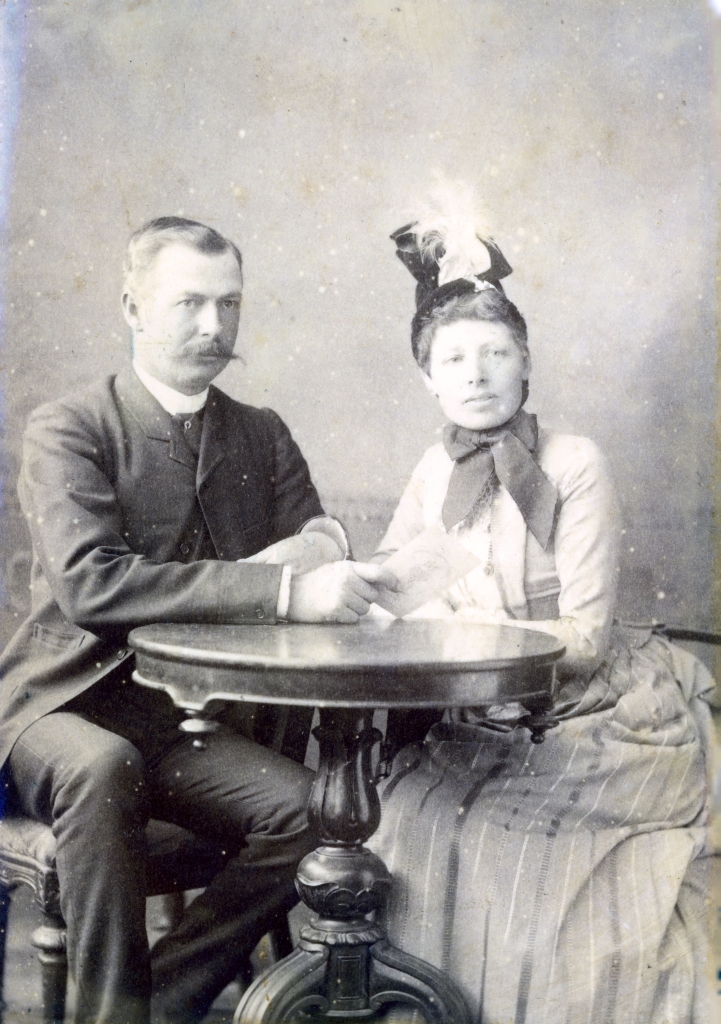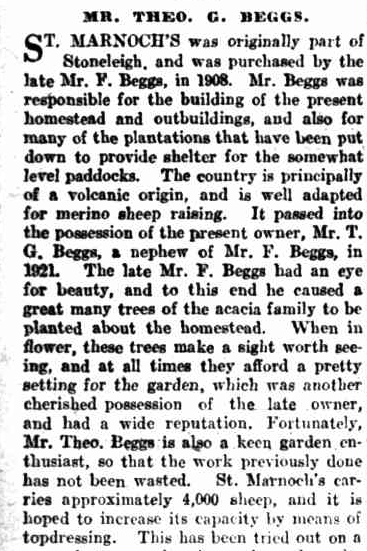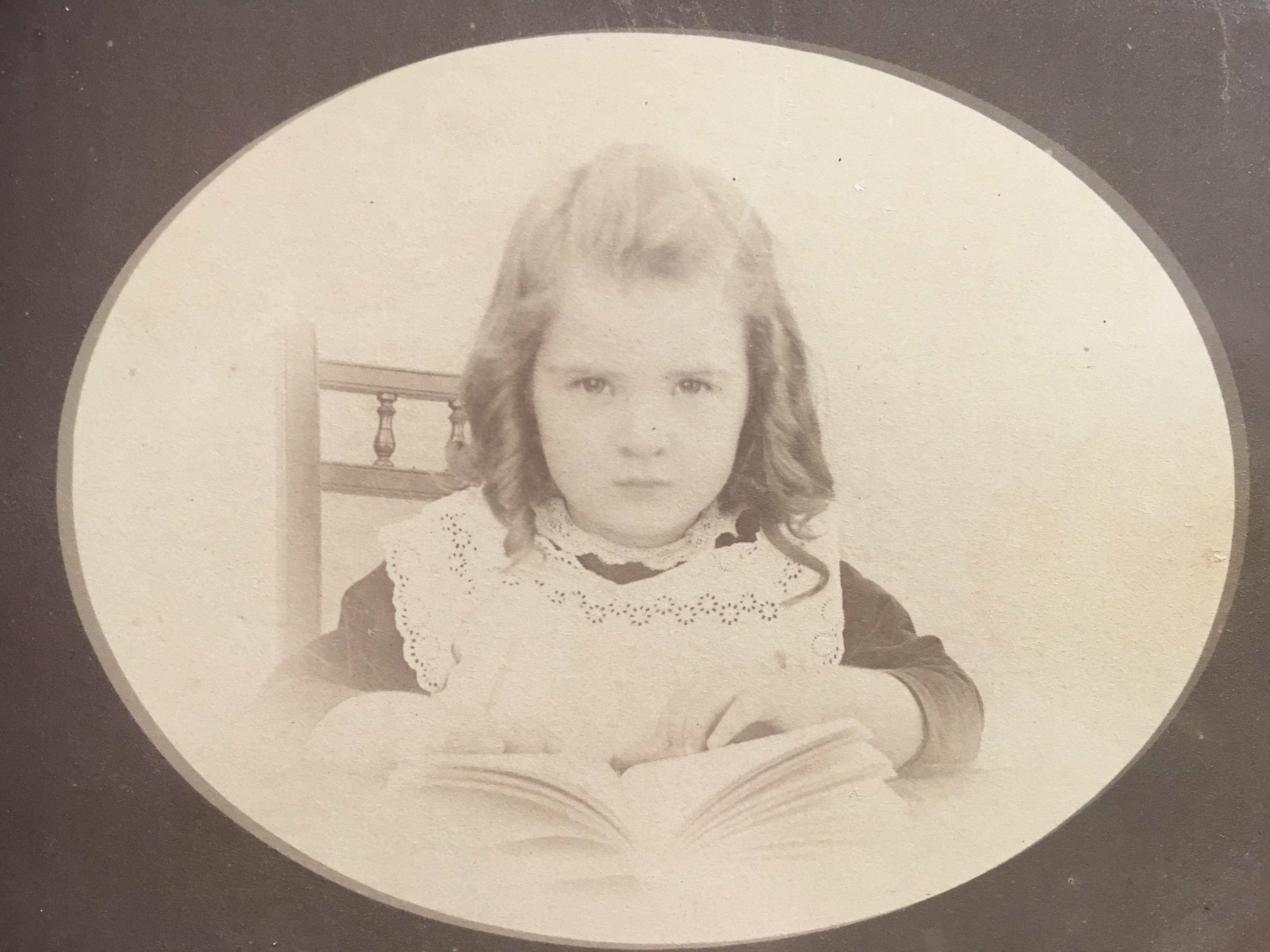Edward Walter Hughes, my great great grandfather, was born on 11 July 1854 in Noarlunga, South Australia, second of the eight children of Samuel Hughes and Sally Hughes née Plaisted.
On the 11th instant, at Kingston, Noarlunga, Mrs Samuel Hughes, of a son.
South Australian Register 13 July 1854
When he was two years old the family moved to Bendigo in Victoria, where his grandfather Edward Hughes was in the timber business. Samuel Hughes moved to Melbourne with his family where he set up an importing and timber merchant firm with the name ‘Hughes Lord & Co’.
Walter Hughes and his brother John went to school at Scotch College from 1867 – 69. In 1869 the family moved to Mount Gambier, in South Australia, where Samuel again founded a timber business.
In about 1870 Walter joined the National Bank of Australasia in South Australia; he ended up in charge of its Naracoorte branch. He resigned in 1873 when his father Samuel returned to Melbourne to establish Samuel Hughes & Co, Importers and Merchants. At this time, the family lived in Moonee Ponds.
In Melbourne, Walter, then nineteen, joined the Bank of Victoria. He was posted for some time to Dunolly as relieving officer, but by 1882 had returned to Melbourne.
Edward married Jeanie Hawkins in Dunolly on 25 September 1883.
HUGHES—HAWKINS.—On the 25th ult., at the Presbyterian Church, Dunolly by the Rev. J. W. Lawson, brother-in-law of the bride, Edward Walter, eldest son of Samuel Hughes, Tan-y-ffordd, Ascotvale, to Jeanie, youngest daughter of the late S. P. Hawkins, Melville Forest Station, Coleraine.
The Argus 2 October 1883
They had four children, the first two born in Melbourne, the second two in Beaufort, where Walter had been posted by the Bank of Victoria:
- Beatrix 1884–1943
- Reginald Hawkins 1886–1971
- Vyvyan Westbury 1888–1916
- Cedric Stuart Castlereagh 1893–1953


Walter spent thirty-three years working for the Bank of Victoria in Beaufort. Busy in local affairs, he was described on his retirement due to ill-health in 1919 as “one of the most active residents of Beaufort”.
BEAUFORT.
The Ballarat Star 23 October 1919
VALEDICTORY.
Over £50 was subscribed for the purpose of making a presentation to Mr E. W. Hughes (for 33 years manager of the Bank of Victoria, Beaufort) prior to his departure for Melbourne. A number of representative citizens met Mr and Mrs Hughes on Monday, and expressed their appreciation of their valuable services to the town and district. On behalf of the people of Beaufort and district, Mr J. R. Wotherspoon presented Mr Hughes with a pigeon blood ruby ring and a purse of sovereigns, and Cr R. A. D. Sinclair (shire president) presented Mrs Hughes with a solid leather travelling bag. Both gentlemen referred in eulogistic terms to the good qualities of Mr and Mrs Hughes as citizens, expressed regret at their departure, and wished them health, prosperity and happiness in the future. Their remarks were endorsed by Messrs E. J. Muntz, G. H. Cougle, and A. L. Wotherspoon. Mr and Mrs Hughes feelingly returned thanks.
On 2 July 1922 at his home at 19 Oakwood Avenue, Brighton, Walter died at the age of sixty-seven, from diabetes and heart failure. He was buried in Brighton Cemetery.
The remains of Mr. Edward Walter Hughes, 67, who died on Sunday at Oakwood avenue, North Brighton, were interred today in the Church of England portion of the Brighton Cemetery. The Rev. Perry Martin officiated at the graveside. Born in South Australia, Mr. Hughes had lived in Victoria for 50 years. He was manager of the Bank of Victoria at Beaufort for 30 years. He has left a widow, two sons, and a daughter. The funeral arrangements were carried out by Monkhouse and Son.
The Herald (Melbourne, Victoria) 4 July 1922
HUGHES On the 2nd July at his residence, 19 Oakwood Avenue, Brighton. Edward Walter, the beloved husband of Jeanie Hughes, aged 67 years. (Private Interment.)
The Argus 4 July 1922
Mr Edward Walter Hughes died on Sunday at North Brighton. Born in South Australia, Mr Hughes had lived in Victoria for 50 years. He was manager of the Bank of Victoria at Beaufort for 30 years. He has left a widow, two sons, and a daughter.
The Ballarat Star 5 July 1922
Walter Hughes was something of a poet, and some of his verse was published in various newspapers between 1902 and 1916. My cousin Gordon Hughes has compiled a booklet of his poems, “E. W. Hughes’s Poems”, and has kindly given me his permission to attached it here.
One of his poems was published in the Illustrated Sporting and Dramatic News with the remark that “Mr E.W. Hughes, of Beaufort, has followed up his recent successes, by winning the ‘Illustrated Sporting and Dramatic News’ first prize of £1 1s for the best verse of eight lines descriptive of Cup Day. He also was placed third in the paper’s competition for best anecdote of a Melbourne or Caulfield Cup day.”
These successes, however, were insufficient foundation for a career as professional poet and, like the Lloyd’s bank-clerk T.S. Eliot, Walter Hughes did not abandon his day job. [It is interesting to note that Eliot had a high opinion of the cultural significance of Derby Day, and horses, though not necessarily thoroughbreds, appear in his verse, among them the famous lonely cab-horse who steams and stamps.]
CUP DAY 'Tis the Melbourne Carnival once again, and the heart of the sportsman is glad; Though a stranger would think at the Flemington show we'd all gone galloping mad. In the grandstand the shimmer of silk is seen; on the flat the simmer of fun; And the "Books" on the Hill, with the pencil and quill, are laying the "odds" – bar none. In the saddling paddock, before "The Cup" race, the "punters" are keen on their "tips", And wagers are laid in stentorian tones, and also by feminine lips. Horses in line—they're off!—and the sheen of the colours passing the crowded stand Makes a race to remember—no matter who wins—the "Gem" of this Southern land.
RELATED POSTS:
Wikitree:





































